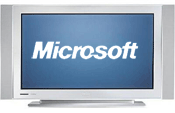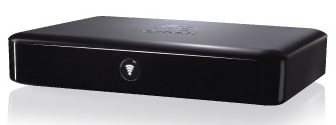 I don’t get the Sony Mylo, but then again, I’m not a 14-year-old.
I don’t get the Sony Mylo, but then again, I’m not a 14-year-old.
Sony introduced at CES 2008 a successor to the first Mylo called the Mylo COM-2, which addresses many shortcomings of its predecessor released in September 2006. It now supports the most popular messaging program in the U.S., AOL Instant Messenger, and it can playback Flash movies, making YouTube accessible.
Mylo COM-2 (see it in action via ubergizmo.com) will go on sale this month and is expected to cost about $300. Billed as a “personal communicator”, it still has a slide-out keyboard and Wi-Fi connectivity, but the screen resolution has been improved to 800 by 480 pixels and it includes a 1.3 megapixel camera.
Continue reading »
 Vudu
Vudu Broadly speaking, there exists two apposing camps in the battle to deliver Internet TV into the living room. On one side are devices that connect to and run on the “open” Internet: consumer-facing set-top boxes (think TiVo, AppleTV or Vudu), along with Internet-connected game consoles, DVD players and televisions. On the other side are Internet Protocol Television (IPTV) services offered by major Telcos such as AT&T.
Broadly speaking, there exists two apposing camps in the battle to deliver Internet TV into the living room. On one side are devices that connect to and run on the “open” Internet: consumer-facing set-top boxes (think TiVo, AppleTV or Vudu), along with Internet-connected game consoles, DVD players and televisions. On the other side are Internet Protocol Television (IPTV) services offered by major Telcos such as AT&T. One of the highlights of CES (Consumer Electronics Show) each year is
One of the highlights of CES (Consumer Electronics Show) each year is  Logitech-owned Slim Devices
Logitech-owned Slim Devices  With the death of copyright-protected digital music imminent, several questions come to mind. Chief among them: What’s next for iTunes? And does anybody want to pay for music anymore?
With the death of copyright-protected digital music imminent, several questions come to mind. Chief among them: What’s next for iTunes? And does anybody want to pay for music anymore?
 Archos, best known for its portable media players, is the latest company to enter the highly competitive and volatile consumer facing set-top box market. Offered in 80GB ($249) and 250GB ($349) versions,
Archos, best known for its portable media players, is the latest company to enter the highly competitive and volatile consumer facing set-top box market. Offered in 80GB ($249) and 250GB ($349) versions,  The video Website Veoh is adding — albeit unofficially — more videos from traditional TV networks, with the content this time coming from Hulu, the NBC-Fox joint venture.
The video Website Veoh is adding — albeit unofficially — more videos from traditional TV networks, with the content this time coming from Hulu, the NBC-Fox joint venture.